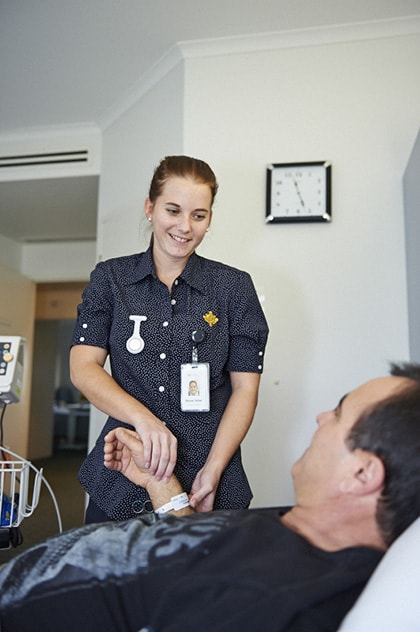In the past, many doctors and nurses believed pain was a natural, inevitable, acceptable and harmless consequence of surgery and trauma.
This is not true.
It is now known inadequate treatment of severe acute pain, coupled with the physiological response to surgery known as the stress response, can have a number of adverse consequences for patients.
This can include complications such as heart problems (myocardial ischemia) or heart attack (myocardial infarction) and pneumonia.
Severe acute pain after surgery may also increase the risk of persistent (chronic) pain.
What is pain?
Pain can be broadly classified into two main types, nociceptive and neuropathic. You can have both at the same time.
- Nociceptive pain is the most common type of pain in hospitals. It usually described as sharp, aching or throbbing pain. From the clinical perspective, it results from the stimulation of specialised sensory nerve endings called nociceptors, as a consequence of tissue damage or inflammation (e.g. after surgery, infection or trauma).
- Neuropathic pain (nerve pain) is associated with injury or disease of the peripheral or central nervous system. It is often described as a burning or heavy sensation or numbness in the affected area. Neuropathic pain is a common cause of chronic symptoms, but can also be a component of acute pain (e.g. following surgery for trauma).
Why would you see a pain nurse during your hospital stay?
As nurses working in pain management we can help you understand pain, identify the threats that contribute to or maintain your pain and help you plan for the road to recovery.
We can help you make sense of the advice you have been given.
Research has shown a nurse-led acute pain service reduces patients’ pain levels and influences the pattern of prescribing pain medications.
Our role also goes beyond working with individual patients, so even if you don’t see a specialist pain nurse, we have probably had an effect on your stay. For example, beyond caring for patients one-on-one, we:
- provide education and training of other nurses and physicians
- audit the quality of pain management
- develop guidelines and protocols for pain management practice.
What should you know about pain before coming to hospital?
Before coming to hospital, many people fear that their pain will not be managed or treated well.
Pain is frightening, especially if you don’t know what is causing it. In fact, some people believe that fear of pain is more disabling than pain itself.
You need to be informed and understand as much as possible about your body and your pain. Be sure to ask your doctor or nurse if you have any questions about pain.
About the author
Deidre Richards is an Acute Pain Service Nurse at St John of God Murdoch Hospital. She has been nursing for 30 years with the past seven years dedicated to working pain management.


